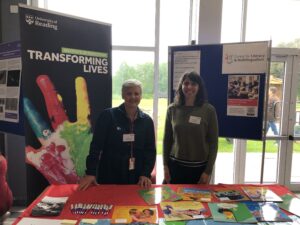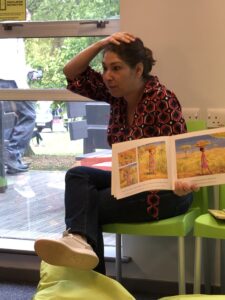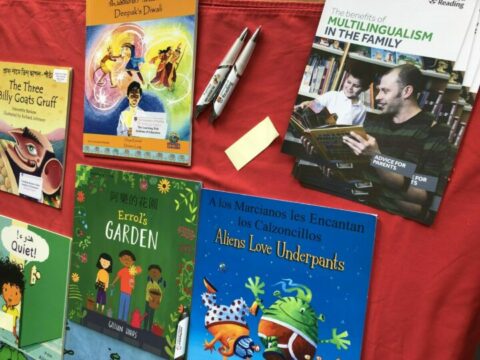By Professor Holly Joseph (CeLM Director- Institute of Education)
 On 13th May 2023, the University of Reading hosted its first ever Community Festival. The programme included music, research talks, workshops and more, and CeLM was delighted to host our now well-established Multilingual Storytime. Student volunteers from the Students in Schools programme read stories in seven different languages: Mandarin, Arabic, Ukrainian, Greek, Cantonese, Spanish and English. We used Dual Language Children’s Books from the Learning Hub on the University’s London Road campus and families from a wide range of language backgrounds came to listen to stories like, Oso pardo, oso pardo, ¿qué ves ahí? (Brown Bear, Brown Bear, what do you See?) and Mufājaʾat Hāndā (Handa’s Surprise), sitting on colourful beanbags while parents and carers looked on.
On 13th May 2023, the University of Reading hosted its first ever Community Festival. The programme included music, research talks, workshops and more, and CeLM was delighted to host our now well-established Multilingual Storytime. Student volunteers from the Students in Schools programme read stories in seven different languages: Mandarin, Arabic, Ukrainian, Greek, Cantonese, Spanish and English. We used Dual Language Children’s Books from the Learning Hub on the University’s London Road campus and families from a wide range of language backgrounds came to listen to stories like, Oso pardo, oso pardo, ¿qué ves ahí? (Brown Bear, Brown Bear, what do you See?) and Mufājaʾat Hāndā (Handa’s Surprise), sitting on colourful beanbags while parents and carers looked on.
Why Multilingual Storytime?
We have been running Multilingual Storytime events through CeLM since 2018. We see them as a crucial part of what we do to promote the use of heritage languages in multilingual families. At our stall, some parents told us that they had been advised to speak only English to their children. We know that this is not good advice and we wanted to make sure that as many families as possible know this. Speaking your home language and reading to your child in that language can have huge benefits in terms of their language development but also in terms of their identity and connection to wider family. By hosting multilingual storytime events in nurseries, schools, libraries and other events, we hope to get this message out an provide advice and support to parents who want to maintain heritage languages. For more information of why this matters and what you can do to promote your home language, see our parent leaflet.
 Parents’ experiences of raising their children multilingually
Parents’ experiences of raising their children multilingually
At our stall at the community festival, many parents and carers came to speak to us about the challenges they faced bringing their children up to be multilingual. The most common challenge was their children always responding in English, but some parents also struggled to maintain using their home language when the rest of the family spoke in English. There are no easy solutions and it can be hard to keep going but remember that your children are still benefiting from exposure to your home language, even when they choose not to speak it. Some parents said that grandparents or other wider family who didn’t speak English were a great way to motivate children to speak their home language, and also keeps family connections strong. Hats off to all parents facing these challenges and remember your children are likely to thank you later (probably MUCH later) in life when they can easily understand and use two (or more) languages!
Find out more about multilingual language development
The final reason we were at the community festival was to tell people about our new, free FutureLearn course on Multilingual Children’s Language Development. This course is aimed primarily at teachers and speech and language therapists who work with multilingual children but is also likely to be of interest to parents and others interested in multilingualism. We have three modules which cover Multilingualism and Identity, Language Development and Multilingualism and Putting it into Practice. Do check it out if you’re interested. There will be another facilitated run of the course later in the summer so do look out for that.


